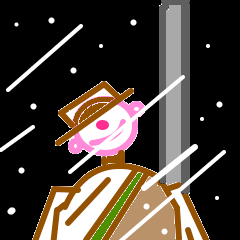Miss Alcott stubbed out her cigarette in the glass ashtray that was on the bar in front of her, next to her pack of Lucky Strikes and a blank book of matches.
"Would you like another Amontillado?" she said.
"No, I shouldn't," said Milford. "I think I mentioned that I'm an alcoholic."
"But you're so young!"
"Yes, but you can be young and still be an alcoholic."
"My dear father used to say, 'Anyone can be a drunk. That's no great accomplishment.'"
"Thus far it's the only thing I've accomplished in life."
"Milford, I like you."
"Really?"
"Yes. At least so far I do."
"Maybe I should leave now while I'm still ahead."
She lifted her small glass of sherry, took a gentle sip, and then put the glass down again. Then she turned and looked at him.
"I should prefer it if you stayed," she said.
Don't blow it, said that familiar voice in Milford's head. Don't blow it now.
"You want another Amontillado, buddy?"
This was the bartender, a man dressed in 19th century fashion, with decorative arm bands on his sleeves, an enormous moustache and mutton-chop sideburns.
"No, thank you," said Milford. "I wonder, do you have ginger ale?"
"We do have ginger ale, but if I may make a suggestion, we've got a mighty fine sarsaparilla. I brew it myself down in the sub-basement."
"Does it have alcohol in it?"
"No, sir, we brew it up specially for the temperance union folks."
"Okay, I'll have one of those then, please."
"Coming right up. What about you, Miss Lou? Another Amontillado?"
"Thank you, no, Bret, I'm still working on this one."
The man went away.
"Miss Alcott," said Milford, "may I ask you a question?"
"By all means, dear boy."
"What is this place?"
"Mr. Whitman didn't tell you?"
"Oh, Mr. Whitman. I'd forgotten about him. Yes, he said something about taking me to, to, what did he say, to Valhalla?"
"Well, that's the answer to your question."
"You mean," said Milford, "this, all this, this place, all these strange people, these endless corridors and strange men's rooms and barrooms full of sad clowns, all this, all this –"
"Yes, you have passed into the next world. Or should I say rather, another world."
"Does this mean I'm dead?"
"No, you're merely visiting."
"But then, everyone here, you, the bartender, that Nathaniel Hawthorne guy –"
"Here's your sarsaparilla, buddy," said the bartender, and he placed a metal tankard on the bar in front of Milford.
"Put it on my tab, Bret," said Miss Alcott.
"Sure thing, Miss Lou," said the man, and he went away again.
Milford picked up the tankard and took a good long drink. It was actually delicious, and quite refreshing, not cloyingly sweet the way ginger ale tended to be, especially after drinking the first four or five glasses in a desperate attempt not to gulp whiskey or gin.
"Wow, that's really good," he said.
"Trade secret," said Miss Alcott, "Bret puts just the tiniest smidgeon of ambrosia into the brew."
"Ambrosia," said Milford.
"Yes. Food of the gods."
"Oh."
Milford decided to let that go for the nonce.
"So," he said, "to get back to what we were talking about, what you're saying is that everyone in here is dead?"
"No, we're not dead. We're immortal."
Milford sighed, a shallow sigh, but a sigh.
Miss Alcott picked up her pack of Luckies, gave it a shake, plucked one out and put it in her lips.
Milford remembered his manners, dug out his lighter, and gave her a light after only five or six unsuccessful clicks. Her gentle fingers touched his hand as she drew on the flame. She exhaled slowly and looked at him through the smoke.
"I'm guessing you're the sort of chap who sighs a lot," she said.
"You guess correctly," said Milford.
"You know, Milford," she said, "once you've worked in a military hospital as a nurse, as I have done, albeit briefly, you realize there are far worse torments than spiritual ones."
"I know," said Milford. "Or, rather, in theory I know, as I have led a very coddled life."
"Far worse torments," repeated Miss Alcott.
It was all Milford could do to stifle another sigh.
"Listen, Miss Alcott, I hope you won't take this the wrong way, but I wonder if you would care to, to –"
"What?"
He wanted to ask her to relieve him of his virginity. Why was it so hard just to say it?
Just ask her, said the voice, the voice of his bold alter ego, known as "Stoney".
"I wonder," continued our hero, "if we could go somewhere, somewhere private, where we could, uh –"
"Make love?"
"Thank you," he said.
"Well, yes, we could," said Miss Alcott. "But we don't have to leave quite this second, do we?"
"Oh, no, not at all –"
"I should like at least to finish my cigarette, and my Amontillado."
"Yes, of course, please."
"So I can take my time?"
"Certainly. I didn't intend to, uh –"
"So you're not in any great hurry?"
"Oh, no, um, uh, by all means –"
He'd waited this long, what was another quarter century or so?
"Because here's the thing about experience," she said. "Once you've had it, that's it. You've had it. And you might even find that you were thinking of something else while you were having the experience. And then you're back to looking forward to the next experience, during which you will be perhaps thinking of something else, possibly even anticipating yet another experience that you won't appreciate while it's happening. Until at last comes that final experience. Your life flickering away, and as it flickers you will be thinking of all the experiences you had in your brief sojourn in your so-called life when you were thinking of something else, even as you're about to experience the ultimate experience of all. And maybe then you will realize that the something else itself is the experience."
"Hello, Lou," said a young woman, who was suddenly standing there.
"Hi, Lou," said another young woman, who was holding a cigarette.
Like Miss Alcott, they were both dressed in 19th century fashion.
"Introduce us to your new gentleman friend," said the first woman.
"Of course," said Miss Alcott. "Milford, allow me to introduce Miss Dickinson and Mrs. Stowe."
"Call me Emily," said the first woman.
"And please call me Harriet," said the other one.
Milford climbed off of his stool, not falling, and shook hands in turn with the two ladies.
Say something, said the voice in his head.
"Very, uh, pleased to meet you," he said.
"And shall we call you Milford?" said the one called Emily.
"Yes, please."
"An unusual prénom," said the one named Harriet.
Here we go again, thought Milford, But just get it over with, said the subcranial voice.
"My actual first if not Christian name is Marion," said Milford. "My middle name is even worse, Crackstone. Therefore I prefer to be called simply by my last name, which is the aforementioned Milford."
"You should I pray pardon me for saying so," said Emily, "but you have a passing strange way of speaking,"
"That might be because I am an idiot," said Milford, "lacking in the social or any other sort of graces."
"Milford's a poet," said Miss Alcott.
"That explains it, then," said Emily. "I too have been accused of strangeness. And does the strangeness come from my avocation of scribbling cryptic lines of verse, or, did the oddness inherent in my character cause me to become just such a scribbler?"
"Um," said Milford.
"Good answer, Milford," said Harriet. "And, please, resume your seat. We didn't want to crash your little party."
"Just wanted to say hello," said Emily.
Awkwardly Milford climbed back onto his stool.
Be a gentleman, said the internal voice. Offer to buy them a drink. Show some breeding.
"May I get you ladies something to drink?" said Milford.
"Thought you'd never ask," said Harriet.
"Thanks, Milford," said Emily. "I'll take a martini."
"Make that two," said Harriet. "And thank you, kind sir."
Milford lifted his narrow hindquarters from his seat, the better to extricate his old Boy Scout wallet.
Look, said Stoney the alter ego, so far you haven't totally fucked things up yet, so take my advice, if you have something stupid to say, don't say it.
Milford raised a finger in an attempt to gain the bartender's attention.
And just then, as if they were all in a movie, Milford became aware of the song playing on the jukebox, the likes of which would never be allowed by the Production Code, a woman singing:
You know my other man is out of town,
your other woman she's not around.
Now is the time to break 'em down,
let's get drunk and truck...


















































